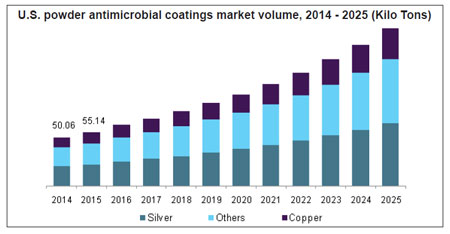|
Global Antimicrobial Coatings Market
The global
antimicrobial coatings market size was valued at USD 2.44 billion in 2015.
Growing concern regarding cleanliness in various professional industries has led
the rapid development of this industry. These are used to protect surfaces
against micro organisms which primarily includes parasites, germs, bacteria and
unwanted micro-organisms.

Rising
concern regarding the growth of hospital-acquired infections among human beings
is also an important factor to boost the overall industry growth. Nowadays,
doctors prefer using these products as compared to disinfectants and powerful
cleaning agents. This would also help to reduce both coat and time for the
hospitals in which they are increasingly used. They help in stopping the spread
of germs, which can otherwise cause weakened immune systems among people.
Never the
less, health concerns related silver usage in various applications along with
strict regulations in the European Union and the U.S. is presumed to create the
hindrance for the overall demand. The SHER-NAR coating which primarily consists
of three coat finishing process is required to meet the standards of the
American Architectural Manufacturers Associationís specification. AAMA 2605-13
is considered the most stringent solution used mainly in architectural
applications.
In recent
past, the FDA began considering drug-device combinations as a separate
regulatory class. They meet the safety and efficacy part based on specified
requirements. Moreover, the guideline has also been established for urological
devices with antimicrobial claims.
In recent
past, the antibiotic local application directly on the local surface is
considered more efficient as compared to antibiotics penetration through biofilm.
The bacteria is killed instantly before the biofilm is formed. These antibiotics
can be applied in bone cement that is used to fix implants associated with
orthopedic
and orthodontic implants.
Biodegradable surface type containing antibiotics can also be implemented for
the same application with the similar strategy. The antibiotics can be slowly
released directly to the surface tissue interface. The use of poly (D, L-lactide)
which contains gentamycin on orthopedic implants has reduced the infection rates
drastically and also an improvement in recovery after infection.
(
https://www.grandviewresearch.com/industry-analysis/antimicrobial-coatings-market
) |

